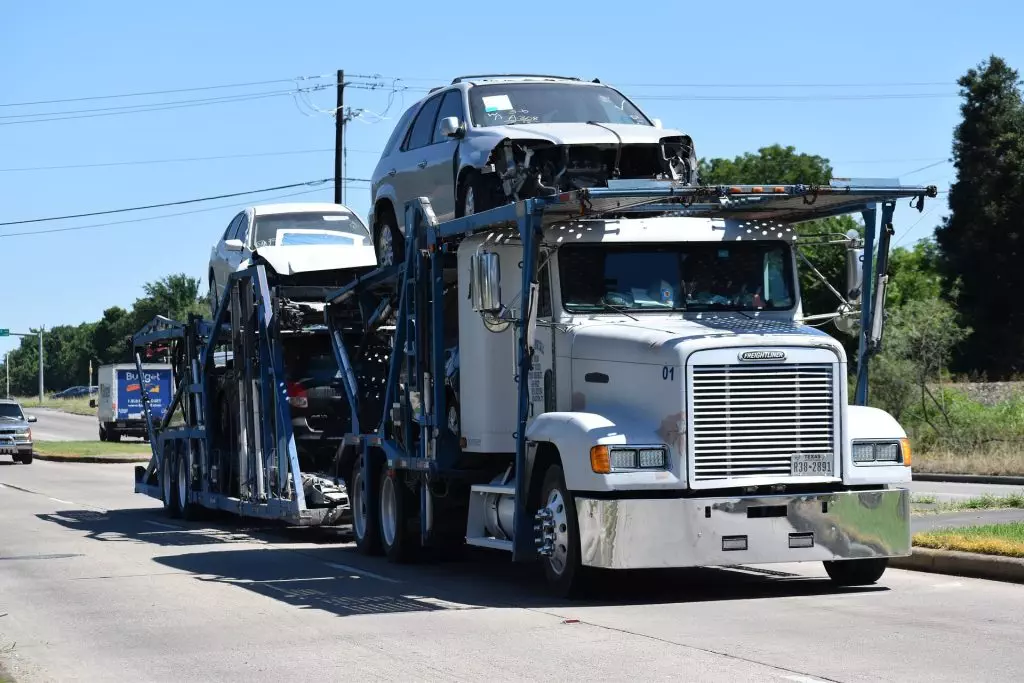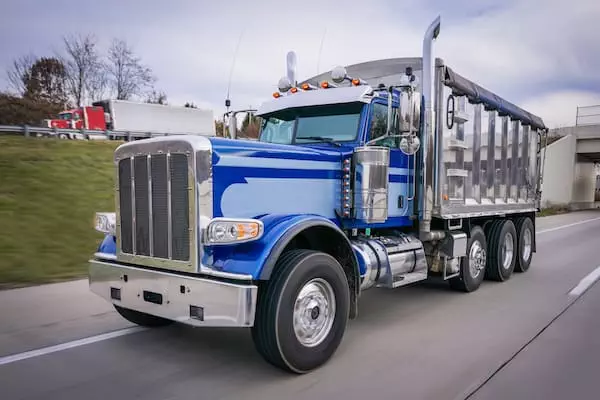Have you ever wondered what those massive trucks used for transporting heavy loads are called? It’s a common question that many of us may have pondered before. Well, fret not, as we’re here to shed some light on this topic.
Those impressive beasts of burden that handle the task of hauling heavy loads are commonly known as “haulage trucks.” With their immense size and robust construction, they are designed to carry and transport a wide variety of materials over long distances. These trucks are specifically built to handle hefty loads, making them an essential part of industries such as mining, construction, and logistics. So, the next time you spot one of these imposing vehicles on the road, you’ll know exactly what to call them – hauling trucks! Hauling trucks are commonly known by various names depending on their type and purpose. Let’s explore the different types of hauling trucks and the specialized terms used to refer to them.
Types of Hauling Trucks
Dump Trucks
Dump trucks are an essential part of construction and mining industries. They are equipped with a hydraulic system that allows them to tilt the bed, enabling easy unloading of materials such as sand, gravel, and debris. Dump trucks are known for their versatility and ability to transport heavy loads efficiently.
Flatbed Trucks
Flatbed trucks have an open-top design with a flat platform bed. This makes them ideal for transporting large and bulky items that cannot fit into traditional enclosed trucks. Flatbed trucks are commonly seen on highways carrying construction equipment, lumber, steel, and other oversized loads.
Tanker Trucks
Tanker trucks, as the name suggests, are designed to transport liquids or gases in specialized tanks. They are commonly used to transport fuel, chemicals, water, and other liquids. Tanker trucks require special training and certification due to the potentially hazardous nature of their cargo.
Refrigerated Trucks
Refrigerated trucks, also known as “reefers,” have built-in cooling systems that allow them to transport perishable goods at controlled temperatures. These trucks are crucial for the transportation of fresh produce, dairy products, pharmaceuticals, and other temperature-sensitive items.
Box Trucks
Box trucks, also referred to as “cube vans” or “straight trucks,” have an enclosed cargo area shaped like a box. They are commonly used for local deliveries and transportation of goods that need protection from the elements. Box trucks come in various sizes and can be equipped with features such as liftgates for easy loading and unloading.
Specialized Hauling Trucks
Cement Mixers
Cement mixers, also known as “concrete mixers,” are specialized trucks used to transport and mix large quantities of cement, sand, water, and other materials needed for construction projects. They have a rotating drum that continuously mixes the ingredients to prevent the concrete from hardening during transit.
Crane Trucks
Crane trucks are equipped with a powerful hydraulic crane mounted on the truck bed. This allows them to lift and transport heavy objects on construction sites or during recovery operations. Crane trucks play a crucial role in loading and unloading oversized or delicate items that require precise handling.
Bulldozers
Bulldozers, although not technically trucks, are often associated with hauling in the construction industry. These heavy-duty machines are used for earthmoving and leveling tasks. Bulldozers have a powerful blade at the front, making them ideal for pushing and clearing debris, soil, and other materials.
Fire Trucks
Fire trucks, also known as “fire engines,” are specialized vehicles designed to fight fires and provide rescue operations. They often carry firefighting equipment, ladders, and water tanks to deliver quick response and support during emergencies. Fire trucks come in various sizes and configurations to meet different firefighting needs.

This image is property of acropolis-wp-content-uploads.s3.us-west-1.amazonaws.com.
Terms and Slang for Hauling Trucks
Big Rigs
Big rigs, also referred to as “18-wheelers” or “semi-trucks,” are large commercial trucks that often haul trailers. They get their name from the combination of a tractor unit that pulls the trailer, creating a massive vehicle with multiple axles. Big rigs are commonly seen on highways, transporting goods over long distances.
Tractor-Trailers
Tractor-trailers, also known as “semis” or “articulated trucks,” consist of a tractor unit that provides the engine power and an attached trailer for carrying cargo. These trucks are widely used for interstate transportation and are capable of hauling significant loads. Tractor-trailers are essential for the logistics industry and play a vital role in the supply chain.
Hauling Trucks by Weight Capacity
Light-Duty Hauling Trucks
Light-duty hauling trucks are designed for smaller loads and tasks. They are often used for local deliveries, landscaping, and light construction work. These trucks have lower weight capacities and are more fuel-efficient compared to their heavier counterparts.
Medium-Duty Hauling Trucks
Medium-duty hauling trucks strike a balance between light-duty and heavy-duty trucks. They can handle a broader range of loads and are often used in industries such as towing, local transportation, and small-scale construction projects.
Heavy-Duty Hauling Trucks
Heavy-duty hauling trucks are built for transporting substantial loads over long distances. They have higher weight capacities and are commonly used in industries such as construction, mining, and long-haul transportation. Heavy-duty trucks often feature powerful engines, reinforced frames, and specialized suspension systems to handle the demands of heavy loads.
Super Duty Hauling Trucks
Super duty hauling trucks are at the top end of the weight capacity spectrum. These trucks are engineered to handle extremely heavy loads and excel in industries such as heavy construction, logging, and mining. Super duty trucks often come equipped with advanced features like extended cabs, reinforced axles, and high-performance transmissions.

This image is property of www.americanautoshipping.com.
Hauling Trucks by Industry
Mining Haul Trucks
Mining haul trucks are specifically designed for the transportation of large quantities of materials in mining operations. These trucks are built to withstand rugged terrains and carry massive loads of minerals, rocks, and ores. Mining haul trucks often feature specialized tires, robust suspension systems, and powerful engines to navigate challenging conditions.
Agricultural Haul Trucks
Agricultural haul trucks, also known as “farm trucks,” assist in the transportation of crops, livestock, and agricultural equipment. These trucks are commonly used in the farming industry for tasks such as delivering produce to markets, hauling livestock, and moving farm machinery.
Construction Haul Trucks
Construction haul trucks are essential in the construction industry for transporting materials such as gravel, sand, concrete, and construction equipment. These trucks are designed to withstand rough terrain and heavy loads, ensuring efficient transportation of construction materials to and from job sites.
Transportation Haul Trucks
Transportation haul trucks play a vital role in the transportation industry by moving goods over long distances. These trucks are used by logistics companies, freight carriers, and independent truckers to transport goods between warehouses, distribution centers, and retail outlets. Transportation haul trucks are often equipped with sleeping berths and other amenities to accommodate long-haul drivers.
Popular Hauling Truck Brands
Ford
Ford is a well-known brand in the hauling truck industry, offering a range of trucks suitable for different hauling needs. Their trucks are recognized for their durability, towing capabilities, and innovation in features such as advanced safety technology and fuel-efficient engines.
Chevrolet
Chevrolet trucks have a long-standing reputation for reliability and performance. With a wide range of hauling truck models, Chevrolet offers options for various industries and weight capacities. Chevrolet trucks are known for their durability, powerful engines, and comfortable interiors.
Ram
Ram trucks, known for their ruggedness and towing capabilities, are a popular choice among hauling truck enthusiasts. Ram offers a range of trucks tailored to different hauling requirements, with features such as spacious interiors, advanced towing technology, and fuel-efficient engines.
Kenworth
Kenworth specializes in manufacturing heavy-duty hauling trucks that excel in demanding industries such as construction, logging, and mining. Known for their robustness and durability, Kenworth trucks are often preferred for heavy load transportation, offering reliability and impressive performance.
Peterbilt
Peterbilt trucks are renowned for their quality craftsmanship and innovative designs. They offer a range of hauling trucks built for durability and efficiency. Peterbilt trucks are highly regarded for their versatile configurations, advanced safety features, and exceptional driver comfort.

This image is property of lemonbin.com.
Factors to Consider When Choosing a Hauling Truck
When selecting a hauling truck, there are several factors to consider to ensure the right truck for the job. These factors include:
Payload Capacity
The payload capacity dictates the maximum weight a truck can safely carry. It is crucial to choose a truck that can handle the intended load without exceeding its limits. Factors such as axle configurations, suspension systems, and body types can affect the payload capacity of a truck.
Fuel Efficiency
Fuel efficiency plays a significant role in the overall operating costs of a hauling truck. Choosing a truck with better fuel economy helps reduce expenses and environmental impact. Factors such as engine technology, aerodynamics, and transmission efficiency influence a truck’s fuel efficiency.
Durability
Durability is essential to withstand the demands of hauling heavy loads over extended periods. Robust construction, high-quality materials, and reliable components are critical for ensuring a truck’s longevity and minimizing downtime.
Versatility
Consider the versatility of a hauling truck and its compatibility with different tasks. Trucks with flexible configurations, adjustable suspensions, and adaptable bodies can be more versatile, allowing for a wider range of hauling applications.
Licensing and Regulations for Hauling Trucks
Operating hauling trucks requires adherence to various licensing and regulations to ensure safety and compliance. Some important considerations include:
Commercial Driver’s License (CDL)
Most hauling trucks require drivers to hold a Commercial Driver’s License (CDL) to operate legally. CDL requirements vary depending on the weight class and type of truck being driven. Obtaining a CDL typically involves written tests, skills testing, and medical examinations.
Weight and Size Restrictions
There are specific weight and size restrictions imposed on hauling trucks to maintain road safety and protect infrastructure. Compliance with weight limits, height restrictions, and axle weight distribution is crucial to avoid fines and damage to roadways.
Hours of Service (HOS) Regulations
Hauling truck drivers must adhere to Hours of Service (HOS) regulations, which govern the maximum driving and duty hours allowed within a specific timeframe. HOS regulations are designed to prevent driver fatigue and promote road safety. Drivers are required to maintain accurate logbooks or use electronic logging devices (ELDs) to record their driving time and rest breaks.

This image is property of assets.website-files.com.
Safety Measures for Operating Hauling Trucks
Ensuring safety while operating hauling trucks is of utmost importance. Some important safety measures to follow include:
Regular Maintenance and Inspections
Regular maintenance and inspections are essential for keeping hauling trucks in optimal condition. Routine inspections identify potential issues, allowing for timely repairs and preventing breakdowns on the road. Regular servicing of engines, brakes, tires, and other critical components helps ensure safe operation.
Proper Loading and Securing of Cargo
Loading and securing cargo correctly is crucial to prevent accidents and damage to the truck and its surroundings. Overloading or unevenly distributed cargo can negatively impact a truck’s stability and handling, increasing the risk of accidents. Proper securing of cargo with straps, chains, or other appropriate methods is necessary to prevent shifting or falling during transit.
Safe Driving Practices
Adopting safe driving practices is vital for hauling truck operators. This includes obeying speed limits, maintaining a safe following distance, and avoiding distractions while driving. Additionally, understanding and adapting to weather and road conditions, using turn signals, and practicing defensive driving techniques contribute to safe operation.
Emerging Technologies in Hauling Trucks
The hauling truck industry continues to embrace technological advancements to improve efficiency, safety, and environmental sustainability. Some emerging technologies in hauling trucks include:
Electric and Hybrid Trucks
Electric and hybrid trucks are gaining traction as a more sustainable alternative to traditional diesel-powered trucks. These trucks produce fewer emissions, reduce operating costs, and contribute to a cleaner environment. Advances in battery technology continue to extend the range and improve performance of electric and hybrid hauling trucks.
Autonomous Trucks
Autonomous trucks, also known as self-driving trucks, are being developed to automate haulage operations. These trucks use advanced sensors, cameras, and artificial intelligence to navigate and operate without direct human input. Autonomous trucks have the potential to increase efficiency, reduce labor costs, and enhance safety on the roads.
Telematics Systems
Telematics systems combine GPS technology with onboard sensors to gather and transmit real-time data about hauling trucks. This data includes information about fuel consumption, vehicle diagnostics, driving behaviors, and more. Telematics systems can help fleet managers optimize routes, improve fuel efficiency, and proactively address maintenance needs.
In conclusion, the world of hauling trucks offers a diverse range of options to meet various hauling needs in different industries. Understanding the different types, terms, weight capacities, brands, and factors to consider is essential when choosing the right hauling truck. Adhering to licensing and regulations, following safety measures, and embracing emerging technologies contribute to a safer, more efficient, and sustainable future for the hauling truck industry.

This image is property of www.topmarkfunding.com.


